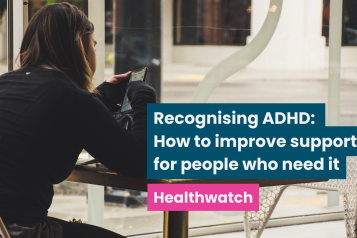The hidden wait to be prescribed ADHD medication

The impact ADHD has on people’s lives can be profound and can be spread across multiple areas of their life. Recent research from Healthwatch, found that for some a diagnosis could be life-changing, allowing them to understand and accept their condition, give them new strategies to manage their ADHD traits and look after their mental health and wellbeing.
Feedback also showed that medication could help with common ADHD traits such as poor organisation, impulsivity and difficulties concentrating.
“Being diagnosed aged 61 and subsequently being medicated has had a massive positive effect on my life on so many levels. I can now sit and read a book which I couldn’t beforehand. I am eating and looking after myself so much better. I’m finding it much easier to actually listen to other people. I can sit and watch the TV now.”
White British woman, 50 - 64, County Durham
The experiences people shared suggested that not everyone who had been diagnosed with ADHD was receiving medication. For some this might be out of choice, or medical complications, but Healthwatch also heard about the lengthy waits people faced for a prescription after the already lengthy wait for an assessment.
Why are there long waits to be prescribed ADHD medication after diagnosis?
According to NICE guidance, all medication for ADHD should only be initiated by a healthcare professional with training and expertise in diagnosing and managing ADHD. People who have been diagnosed with ADHD need a full physical and mental health assessment including having an electrocardiogram (ECG) before an assessment of which medications might best help them can take place.
The healthcare professional will spend time working out the right medication and optimal dose for each patient. This process is known as titration and can take several months.
Once the right medication and dose has been established, the healthcare professional should arrange for the patient’s GP to take over prescribing the medication under a shared care agreement.
A healthcare professional with training and expertise in managing ADHD should undertake a comprehensive review of ADHD medication at least once a year and discuss with the patient whether medication should be continued.
How long are people waiting?
There are no official statistics on the wait to be prescribed ADHD medication, but information on providers’ websites suggest that waits could be up to a year.
The South West London and St George’s Mental Health NHS Trust’s website states that the average number of weeks patients were waiting at the end of last month for ADHD titration was 23.5 weeks in Merton, 30.7 weeks in Richmond and 23.5 weeks in Sutton. Psychiatry UK, a private organisation that does private and NHS Right to Choose ADHD assessments, states that their wait time for adult ADHD titration is up to 10 months between the ADHD assessment and the start of titration.
What is the impact of waiting?
The process of titration is important to ensure people are getting the right medication for them and this can take a few months. Yet, the wait for medication comes as an unexpected hurdle after the long wait for a diagnosis.
“I have the diagnosis, which took 4 years, but I am still 20 months later, waiting to go on the waiting list for medication - which was the whole reason for wanting a diagnosis.”
White British woman, 25 – 49, Essex
Healthwatch also found that people faced a battle with their GP to get them to take over shared care and give them NHS prescriptions (even where the assessment and titration were undertaken via Right to Choose).
People with ADHD described how devastated they felt having waited a long time for a diagnosis, a further wait for titration and then being rejected by their GP.
Someone who had waited six years in total to go through the process of referral, diagnosis by a Right to Choose provider and then titration, said:
“I spoke to my GP today who has dismissed any support as it must be done with clinical partners and possible shared care. It feels like a lack of empathy in GP surgeries has caused a lot of stress along with ridiculous waiting times!”
White British man, aged 25 – 49, Darlington
Healthwatch recommendations to improve care
Publish official data on titration waiting times.
There are no official targets or data collected on waiting times for titration. External research shows variation in waiting times for some, and a totally hidden wait for others. Our research shows publication of this data would provide people with clarity, particularly after long waits for assessment.
Fix shared care commissioning so people can get the medication they need.
Whether discharged from a hospital team with a prescription or sent back to GPs from independent providers, we have heard from people who struggle to access the medicine they need following an ADHD assessment. Clarity over shared care commissioning and follow-up arrangements is needed, which will require collaboration between NHS England, the General Medical Council (GMC), and the Care Quality Commission (CQC).
Improve communication and signposting to help people understand the process to accessing ADHD medication.
This should be via NHS information shared when people are referred, and from independent providers including those who offer assessment-only services. The government should also look at how to address issues from unregulated and unregistered independent providers conducting assessment-only services.
Pilot the prescription of ADHD medicine by GP and pharmacy teams.
In the long term, we have called for ADHD assessments to move from hospital teams, where there are long waits, to primary and community care teams who work closer to people’s homes. As part of this shift, earlier prescription of preventative medication should be explored, to better help people while they wait for an assessment.
Act to mitigate the impact of medication shortages.
The government must continue to find solutions to medicine shortages while doing more to keep the public up to date. This includes producing clear and official information to support people experiencing a shortage to understand timelines and next steps.


